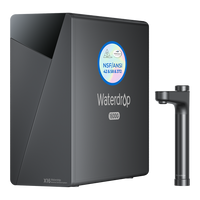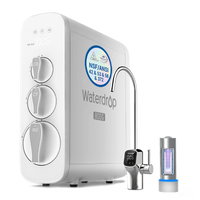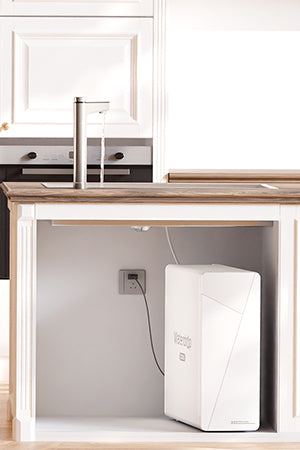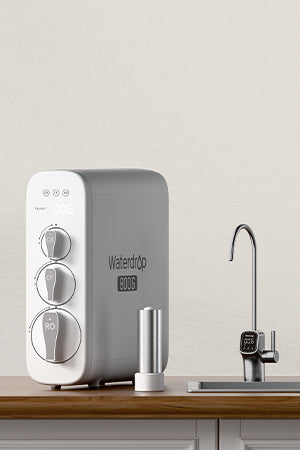How Do RO Water Filtration Systems Work?
The
reverse osmosis system involves applying pressure to a semipermeable membrane to force water through the membrane. All solids in the solution are driven out of the system, and the pressure-induced concentration gradient pushes water molecules across the membrane. A membrane designed for reverse osmosis is constructed to allow water molecules to pass through while simultaneously retaining larger molecules and dissolved solids. The pressure that is applied across the membrane in reverse osmosis water filter systems is what causes the change in concentration that is seen when the systems are activated.
Reverse Osmosis Filtration Offers Enhanced Advantages
A reverse osmosis water filter is undoubtedly one of the most comprehensive filtration systems now available on the market. It is noteworthy because it eliminates an astonishing 99% of the dissolved solids, significantly enhancing drinking water’s purity. A RO system works better than a water distiller, even if there is an alternative method to reduce
total dissolved solids (TDS) .
One of the key benefits of this is its ability to effectively reduce harmful dissolved contaminants in water, enhancing its safety and healthiness for consumption. Additionally, the RO system effectively reduces the salt level in your drinking water, ensuring that the highest health standards are maintained. In addition, the system effectively eliminates unpleasant tastes and odors, enhancing the overall enjoyment of drinking water.
The RO water system is an environmentally friendly choice when there is a significant emphasis on environmental consciousness. It is an excellent replacement for bottled water and generates less plastic waste due to its ecologically friendly methods. The system is very convenient to set up and maintain, mainly due to its compact design that seamlessly fits below your kitchen sink. Thanks to the straightforwardness of this integration, you and the whole family may effortlessly transition to a purer, more nourishing, and more enjoyable drinking water.
Waterdrop’s Top-selling RO system
Waterdrop 800GPD RO System with UV Light for Sterilization
An upgraded RO system is the much superior
Waterdrop 800GPD RO system . Manufacturers have developed innovative features that allow large homes and small companies to receive filtered water.
Low-energy Consumption and Environmental Friendliness
The Waterdrop 800GPD utilizes a cutting-edge water conservation technique, resulting in one of the most minimal drain ratios currently on the market. When 3 cups of filtered water are used, just one cup of effluent is produced. You can now protect the environment while reducing your monthly water utility payments.
High-Tech LED UV Sterilizer
The inclusion of a sophisticated LED sterilizer from Waterdrop enhances the efficacy of this water filter system, eliminating 99.9% of the viruses and bacteria found in the source water. The breathing light activates when it detects the water flow and deactivates when it ceases to flow. Consequently, it conserves energy.
Low-energy Consumption and Environmental Friendliness
The Waterdrop 800GPD utilizes a cutting-edge water conservation technique, resulting in one of the most minimal drain ratios currently on the market. When 3 cups of filtered water are used, just one cup of effluent is produced. You can now protect the environment while reducing your monthly water utility payments.
Higher Filtration Capacity and Better Flow
This water filtration system uses reverse osmosis to produce filtered water, delivering 800 gallons of water at a time. This remarkably expansive filtering capacity enables small enterprises and even big homes to fulfill their drinking water requirements effortlessly. Moreover, the accelerated water flow lets you refill your cup in only six seconds.
Tankless Reverse Osmosis Water System Waterdrop G3P600
The 600 GPD RO system is certified by
NSF/ANSI 372 for using lead-free components and NSF/ANSI 58 for reducing total dissolved solids (TDS). In addition, by NSF requirements, this system effectively reduces the concentration and volume of hazardous substances such as PFAS, carbofuran, alachlor, and chloroform in the water to levels that are considered acceptable. This ensures the safety and well-being of the water you ingest.
Fast Water Flow of 600GPD
An updated reverse osmosis water system, the G3P600 tankless system produces 600 gallons of purified water daily. The Reverse Osmosis system has a fast and consistent water flow rate, filling an 8-ounce cup in 8 seconds. This feature renders it ideal for both drinking purposes and the cleansing of fruits and vegetables.
2:1 Ratio of Pure to Drain
The G3P600 tankless reverse osmosis system can generate a quantity of two cups of purified water while using just one cup of wastewater. This reduces your water bill to some extent.
Eight-Step Filtration
Heavy metals such as hexavalent chromium, as well as radium nitrate, total dissolved solids (TDS), arsenic salt, fluoride, calcium, particles, iron, chromium, PFAS, and chloride, can be effectively removed from tap water by the tankless reverse osmosis system, which has been put through rigorous testing by an official third-party laboratory. In addition, according to the reverse osmosis membrane technical guide, our RO system can attenuate the presence of potentially hazardous compounds such as vinyl chloride, isobutylene, mono butyl ether, and ethylene glycol.
What Is the Process of a Water Softener?
Ion exchange units, often household water softeners, are equipment to remove minerals such as magnesium and calcium from water. The resin beads in the softener trap magnesium and calcium, subsequently transforming them into sodium or potassium. Once the resin beads have reached their maximum capacity of calcium and magnesium, these minerals are removed from the beads by using a highly concentrated salt or potassium solution. The chloride solution obtained after passing through the beads is ultimately discharged as a waste stream into the environment.
Functions of a Water Softener
The accumulation of limescale inside water heaters and dishwashers results from water with a high mineral content. Rust, breaches, and a foul taste in the water you drink are all results that may be brought on by the buildup of minerals in your water supply. When you start the water softener installation, it removes all of the minerals in the water you use for washing or showering. This avoids the possibility of limescale accumulation, which could cause harm to your home.
Water with a high concentration of minerals may cause internal corrosion of pipes, eventually leading to leaks, rust, and damage. Eliminating these minerals benefits your plumbing system since softened water flows more readily through pipes and leaves no mineral deposits behind.
Eliminates Undesired Tastes from Your Water
Sure, homeowners have encountered water with an unpalatable flavor or heightened gum sensitivity due to an excessive mineral content. A household water softener aids in the purification of cooking and drinking water, preventing the accumulation of iron, sulfur, or magnesium. These substances may lead to acidic flavors, rusted fixtures, and compromised hygiene.
Reduced Stains on Plates
Discoloration and stiffness are two potential outcomes that might result from the buildup of soap residues inside the fibers of garments. A further factor that may cause color fading is exposure to chlorine. Using water that has been filtered and softened may help you reduce the number of issues that arise throughout your washing routine. Clothing washed in this fluid retains its suppleness and vibrancy for an exceedingly extended amount of time. By decreasing the impact of chlorine and avoiding soap-curd buildup, water that has been softened and filtered helps to keep your clothing and linens smelling fresh and looking vibrant for a more extended period. Moving to this approach enhances the quality of your washing experience. It safeguards what you spend on clothing by ensuring that your cherished garments have a longer lifespan and are more efficient.
Boost Laundry Productivity
Discoloration and stiffness are two potential outcomes that might result from the buildup of soap residues inside the fibers of garments. A further factor that may cause color fading is exposure to chlorine. Using water that has been filtered and softened may help you reduce the number of issues that arise throughout your washing routine. Clothing washed in this fluid retains its suppleness and vibrancy for an exceedingly extended amount of time. By decreasing the impact of chlorine and avoiding soap-curd buildup, water that has been softened and filtered helps to keep your clothing and linens smelling fresh and looking vibrant for a more extended period. Moving to this approach enhances the quality of your washing experience. It safeguards what you spend on clothing by ensuring that your cherished garments have a longer lifespan and are more efficient.
Selecting the Proper System
Even if using a water softener or RO water purifier can increase your water use daily, installing an RO filter system is the best way to ensure your water is safe to drink. The reverse osmosis system acts as the last safeguard, guaranteeing the hygiene and clarity of your drinking water, with a primary focus on the well-being of your family. The advanced filtration system effectively removes a diverse array of contaminants, ensuring not only pure water but also providing you with a sense of tranquility. Acquiring a reverse osmosis water filtration system not only enhances your water consumption but also safeguards the most precious aspect of your life—the well-being of your family—in a society where health is paramount.
Waterdrop demonstrates significant environmental protection advancements, a collective human obligation. Waterdrop is committed to its mission and actively strives to reduce the use of disposable plastic water bottles. By advocating for sustainable habits, they make a substantial contribution to reducing plastic waste and promoting a healthy world for all individuals. Waterdrop is dedicated to assisting global communities. They aim to provide universal access to potable water by devising innovative remedies.













































































